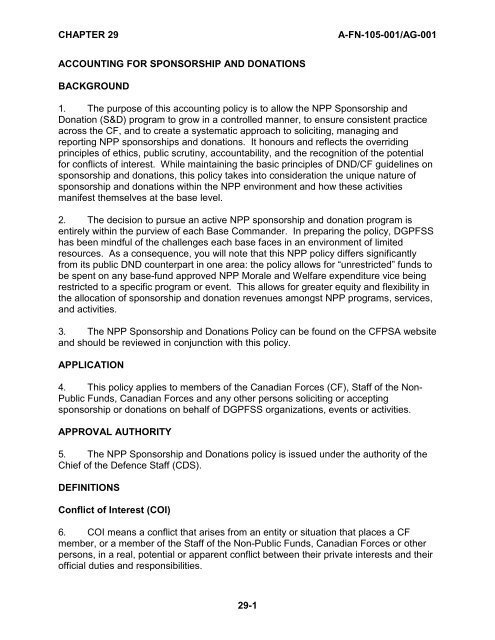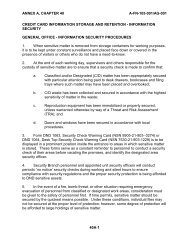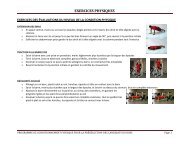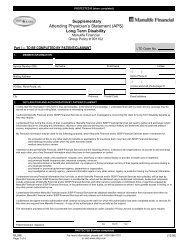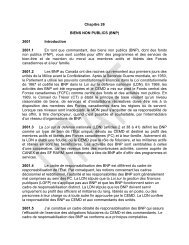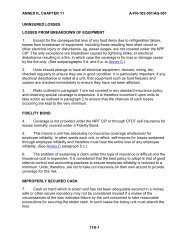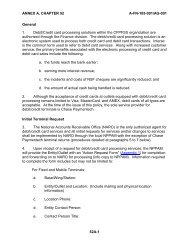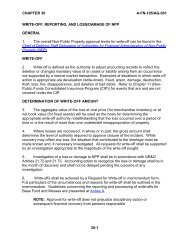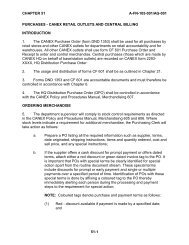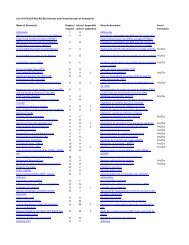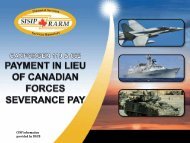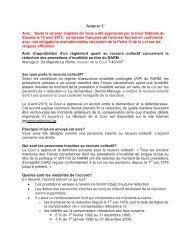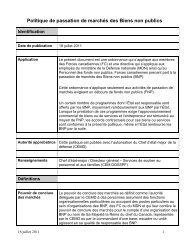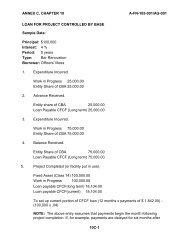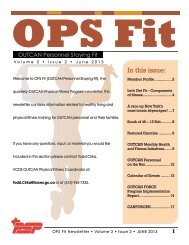CHAPTER 29 A-FN-105-001/AG-001 29-1 ACCOUNTING FOR ...
CHAPTER 29 A-FN-105-001/AG-001 29-1 ACCOUNTING FOR ...
CHAPTER 29 A-FN-105-001/AG-001 29-1 ACCOUNTING FOR ...
You also want an ePaper? Increase the reach of your titles
YUMPU automatically turns print PDFs into web optimized ePapers that Google loves.
<strong>CHAPTER</strong> <strong>29</strong><br />
A-<strong>FN</strong>-<strong>105</strong>-<strong>001</strong>/<strong>AG</strong>-<strong>001</strong><br />
<strong>ACCOUNTING</strong> <strong>FOR</strong> SPONSORSHIP AND DONATIONS<br />
BACKGROUND<br />
1. The purpose of this accounting policy is to allow the NPP Sponsorship and<br />
Donation (S&D) program to grow in a controlled manner, to ensure consistent practice<br />
across the CF, and to create a systematic approach to soliciting, managing and<br />
reporting NPP sponsorships and donations. It honours and reflects the overriding<br />
principles of ethics, public scrutiny, accountability, and the recognition of the potential<br />
for conflicts of interest. While maintaining the basic principles of DND/CF guidelines on<br />
sponsorship and donations, this policy takes into consideration the unique nature of<br />
sponsorship and donations within the NPP environment and how these activities<br />
manifest themselves at the base level.<br />
2. The decision to pursue an active NPP sponsorship and donation program is<br />
entirely within the purview of each Base Commander. In preparing the policy, DGPFSS<br />
has been mindful of the challenges each base faces in an environment of limited<br />
resources. As a consequence, you will note that this NPP policy differs significantly<br />
from its public DND counterpart in one area: the policy allows for “unrestricted” funds to<br />
be spent on any base-fund approved NPP Morale and Welfare expenditure vice being<br />
restricted to a specific program or event. This allows for greater equity and flexibility in<br />
the allocation of sponsorship and donation revenues amongst NPP programs, services,<br />
and activities.<br />
3. The NPP Sponsorship and Donations Policy can be found on the CFPSA website<br />
and should be reviewed in conjunction with this policy.<br />
APPLICATION<br />
4. This policy applies to members of the Canadian Forces (CF), Staff of the Non-<br />
Public Funds, Canadian Forces and any other persons soliciting or accepting<br />
sponsorship or donations on behalf of DGPFSS organizations, events or activities.<br />
APPROVAL AUTHORITY<br />
5. The NPP Sponsorship and Donations policy is issued under the authority of the<br />
Chief of the Defence Staff (CDS).<br />
DEFINITIONS<br />
Conflict of Interest (COI)<br />
6. COI means a conflict that arises from an entity or situation that places a CF<br />
member, or a member of the Staff of the Non-Public Funds, Canadian Forces or other<br />
persons, in a real, potential or apparent conflict between their private interests and their<br />
official duties and responsibilities.<br />
<strong>29</strong>-1
<strong>CHAPTER</strong> <strong>29</strong><br />
A-<strong>FN</strong>-<strong>105</strong>-<strong>001</strong>/<strong>AG</strong>-<strong>001</strong><br />
Deferred (Unearned) Revenue<br />
7. Deferred revenue is revenue received in advance of being earned (unearned)<br />
and revenue recognition must be deferred until the future period or periods in which the<br />
revenue is to be recognized/earned.<br />
Donation<br />
8. A donation is the provision by contributions, gifts or bequest by a person, group,<br />
or organization external to DGPFSS, DND and the CF of funds, goods, facilities or<br />
services without cost to DGPFSS, DND or the CF and without expectation of any benefit<br />
in return (other than public acknowledgement, if agreed to by both parties) which may or<br />
may not support a particular event or activity.<br />
Product in Kind (PIK)<br />
9. Goods, facilities or services received/performed that DGPFSS uses in the normal<br />
course of operations and would have otherwise been purchased and goods facilities or<br />
services received/performed that the organization does not use in the normal course of<br />
operations and would not have normally purchased but is considered to have some<br />
value.<br />
Restricted Contributions<br />
10. Restrictions are stipulations imposed that specify how resources must be used.<br />
External restrictions are imposed outside DGPFSS, usually by the contributor of the<br />
resources. Internal restrictions are imposed in a formal manner by DGPFSS, usually by<br />
resolution of the senior authority. Restricted sponsorship contributions are a rare<br />
occurrence whereby funds can be used solely for a specific purpose.<br />
Sponsorship<br />
11. A sponsorship is a collaborative arrangement between DGPFSS and persons,<br />
groups, or organizations external to DGPFSS, DND and the CF. In such an<br />
arrangement, funds goods, facilities or services are provided to support a particular<br />
DGPFSS event or activity, in exchange for some appropriate non-monetary benefit of<br />
approximately equal value.<br />
Unrestricted Contributions<br />
12. Contributions are neither restricted externally nor internally. Unrestricted<br />
contributions are normally recognized as revenue in the current period.<br />
<strong>29</strong>-2
<strong>CHAPTER</strong> <strong>29</strong><br />
A-<strong>FN</strong>-<strong>105</strong>-<strong>001</strong>/<strong>AG</strong>-<strong>001</strong><br />
OVERVIEW<br />
General<br />
13. Collaborative arrangements between federal government departments and<br />
agencies and the private sector have become common. In this culture, instances arise<br />
where DGPFSS, DND or the CF are approached with sponsorship proposals or<br />
donations, or act to secure sponsorships or donations.<br />
Purpose<br />
14. The purpose of the NPP sponsorship and donation accounting policy is to ensure<br />
that ethical, financial, legal and public affairs matters are respected in the financial<br />
records of NPP.<br />
FINANCIAL ADMINISTRATION<br />
15. Approval of a senior authority is required prior to responding to any sponsorship<br />
proposal or donation, or pursuing any sponsorship or donation initiative. Approval<br />
authorities for sponsorship and donations are detailed in the Chief of The Defence Staff<br />
Delegation of Authorities for Financial Administration of Non-Public Property.<br />
16. The following items received by NPP do not qualify as a sponsorship or donation<br />
and shall be treated as NPP operating revenue:<br />
a. registration and entry fees;<br />
b. licensing fees and royalties;<br />
c. concession fees and revenues;<br />
d. fees for booth or exhibit space;<br />
e. advertising revenues;<br />
f. any fee where the payee receives goods or services of approximate equal<br />
value, with the exception of sponsorship as defined in para 11; and<br />
g. anything received that does not qualify as a gift to the crown<br />
NPP Accounting Procedures<br />
17. The accounting procedures pertain to the receipt and disbursement of funds<br />
received through sponsorship and donations, and the custody and administration of<br />
sponsorship or donated material that becomes NPP.<br />
<strong>29</strong>-3
<strong>CHAPTER</strong> <strong>29</strong><br />
A-<strong>FN</strong>-<strong>105</strong>-<strong>001</strong>/<strong>AG</strong>-<strong>001</strong><br />
18. All sponsored and donated funds shall be receipted (form CF 602) and deposited<br />
with the local NPP Accounting Office (NPPAO) (or directly to the appropriate NPP bank<br />
deposit facility). As per Chap 2 of this manual, Sponsorship and Donation activities<br />
shall be a component of Base Fund’s financial structure, operated as a separate outlet<br />
with an Operating Income Statement. To further enhance national reporting<br />
capabilities, all sponsorship and donation activities shall be recorded by event.<br />
Restricted Contributions – Cash<br />
19. Generally Accepted Accounting Principles (GAAP) dictates that revenues and<br />
related expenses shall be recognized in the same period (the matching principle).<br />
Accordingly, restricted cash contributions received in a period prior to the activity or<br />
event, shall be deferred – initially recorded as unearned revenue upon receipt and<br />
subsequently recognized as revenue in the same future period or periods as the related<br />
expenses that they were intended to fund are recognized.<br />
NOTE : If restricted cash contributions are received in the same period as related<br />
expenses are recognized, revenue recognition is concurrent - there is no<br />
deferment.<br />
Unrestricted Contributions - Cash<br />
20. Unrestricted contributions are normally recognized as revenue in the current<br />
period. However, in some circumstances, although unrestricted contributions are not<br />
“restricted” per se, funds may be collected on the auspices of, or earmarked for a<br />
specific event or activity. In this circumstance, revenues received in advance may be<br />
deferred (recorded as unearned revenue) at the written request of local management<br />
and recognized as revenue in the period the specific event or activity takes place (any<br />
unexpended funds shall also be recorded in the same period). Example: Sponsorship<br />
cash revenue collected on the auspices of “Family Days” received in April with the event<br />
taking place in July – at the written request of the PSP manager, revenue is deferred<br />
until July when Family Days takes place and all deferred revenues are recognized at<br />
that time.<br />
All other unrestricted cash contributions shall be recognized as revenue in the current<br />
period.<br />
Recording of Costs<br />
21. Indirect costs of running sponsorship and donation activities will be recorded as<br />
operating expenses (wages etc). Direct costs associated with specific events will be<br />
recorded as expenses against the specific event (cost of producing a “Family Days”<br />
calendar displaying sponsor’s logos etc.).<br />
<strong>29</strong>-4
<strong>CHAPTER</strong> <strong>29</strong><br />
A-<strong>FN</strong>-<strong>105</strong>-<strong>001</strong>/<strong>AG</strong>-<strong>001</strong><br />
Product in Kind (PIK)<br />
22. When a donation is in the form of real property or goods (versus cash), its value<br />
must be determined by the Authorized Agent in accordance with fair market value<br />
evaluations. Generally, an acceptable fair market value would be that which a willing<br />
buyer would pay to a willing seller in an “arms length” transaction at the time the<br />
donation is made. However, due to potential liability and other legal issues, the<br />
Authorized Agent should consult with their legal advisors before recommending the<br />
acceptance of donations of real property and other items of significant value.<br />
23. The Authorized Agent shall ensure the following:<br />
a. as a component of the written or verbal agreement, the Authorized Agent<br />
and the supplier’s representative shall agree to conditions of delivery;<br />
b. the supplier’s representative will, at the time of delivery, provide an<br />
itemized delivery document reporting the product description, quantities<br />
shipped, and, in some instances, the prices with full extensions;<br />
c. the Authorized Agent shall verify the quantities and condition of the<br />
merchandise received;<br />
d. the Authorized Agent shall record the value of the merchandise received<br />
on the delivery document and acknowledge receipt; and<br />
e. upon transfer of goods from the Authorized Agent to the entity manager,<br />
the entity manager shall sign for and accept responsibility for the control<br />
and issue of goods received.<br />
24. PIK services or goods are to be controlled and accounted for in the same manner<br />
as services or goods paid by cash (see Note). PIK asset and/or revenue will not be<br />
recognized prior to the receipt of properly authorized source delivery documents from<br />
the Authorized Agent. Source delivery documents such as a packing slip, provide proof<br />
of receipt and value of PIK received.<br />
NOTE: Considering the nature of PIK and the administrative burden of<br />
accounting for numerous small items of limited and/or questionable value, such<br />
as t-shirts, ball caps, water bottles, etc., PIK that has a value assessed lower<br />
than $1,000, may not be recorded in the books of account. This does not negate<br />
the requirement for the authorized agent to maintain records of receipt and<br />
disbursement of PIK valued under $1,000. The materiality threshold of $1,000, is<br />
applicable to each event rather than by sponsor. For instance, if PIK is received<br />
from different sponsors for the same event and the aggregate total exceeds<br />
$1,000, PIK shall be recorded in the books of account.<br />
<strong>29</strong>-5
<strong>CHAPTER</strong> <strong>29</strong><br />
A-<strong>FN</strong>-<strong>105</strong>-<strong>001</strong>/<strong>AG</strong>-<strong>001</strong><br />
Current PIK (PIK to be used in the period of receipt - the current accounting<br />
period)<br />
25. Upon receipt of the properly authorized source documents from the authorized<br />
Agent, Current PIK revenues for goods and services used and the offsetting expenses<br />
are simultaneously recognized on the sponsorship income statement and have a nil<br />
effect on the bottom line of the Sponsorship Income Statement.<br />
Deferred PIK (PIK not used in the period of receipt - the current accounting<br />
period)<br />
26. PIK assets are reported for control and management information purposes when<br />
PIK is received in one accounting period and will not be used until a future accounting<br />
period or periods. Upon receipt of the properly authorized source documents (proof of<br />
receipt of PIK, such as packing slip), then the deferred PIK will be set up as a fixed<br />
asset Class 20. PIK will not be amortized. It is reported as a fixed asset only to record<br />
the value of the PIK on the balance sheet. The offsetting accounting action is to<br />
unearned PIK revenue – sponsorship and donations. All deferred product-in-kind is to<br />
be reported within the fixed asset records. PIK is subsequently recognized as revenue<br />
in the same future period or periods as the related expenses that they were intended to<br />
fund are recognized.<br />
27. PIK received for an event (i.e. case of soft drinks) that is surplus upon completion<br />
of the event, may be sold for fair market value as determined by the Authorized Agent<br />
rather than disposed of or earmarked for another event. For control and record<br />
purposes, PIK received for a fundraising event such as an auction, shall be recorded as<br />
PIK in the same manner as PIK for internal use as detailed in para 25 and 26 above.<br />
Cash received for sale or auction is recorded as Sponsorship Revenue Cash (net of tax)<br />
and PIK revenues/expenses are reduced by the net amount.<br />
Summary of Accounting Action<br />
28. Annex A provides a summary matrix of the accounting action for Sponsorship,<br />
Donations, and Product-in-Kind.<br />
Year-End Procedures<br />
<strong>29</strong>. Each year, during the month of March, the BComd shall appoint a Board to verify<br />
the disbursement register and current inventory of PIK. The Board will identify:<br />
a. unserviceable items;<br />
b. missing items; and<br />
c. any other discrepancies.<br />
<strong>29</strong>-6
<strong>CHAPTER</strong> <strong>29</strong><br />
A-<strong>FN</strong>-<strong>105</strong>-<strong>001</strong>/<strong>AG</strong>-<strong>001</strong><br />
30. The completed Board report will be forwarded to the Base Fund/Mess Committee<br />
for appropriate approval of action as per the CDS Delegation of Authority. Once the<br />
report is approved by the Base Fund/Mess Committee, the Board shall witness the<br />
disposal of any unserviceable items, complete a certificate of disposal and forward a<br />
copy to the local NPPAO.<br />
31. The NPPAO will retain the certificate of disposal and minute authority for record<br />
purposes. The fixed asset record will be adjusted based on the approved certificate of<br />
disposal.<br />
Identifying and Approving Sponsorships and Donations<br />
32. To ensure proper treatment of sponsorships and donations and to control the<br />
issue of official receipts (form CF 602), the Authorized Agent shall complete the NPP<br />
Sponsorship and Donation Summary and Approval Form (attached as Annex B to NPP<br />
Sponsorship and Donation Policy on the DGPFSS website). The appropriate approval<br />
authority as per para 15 must sign the form. Upon receipt of the sponsorship or<br />
donation, the Authorized Agent shall forward a copy to the NPPAO.<br />
Tax Implications<br />
33. To qualify as a charitable donation under the Income Tax Act, the transfer of<br />
funds or property must be:<br />
a. voluntary;<br />
b. given without consideration; and<br />
c. without expected return or refund beyond acknowledgement, as agreed<br />
upon by all parties.<br />
NOTE: Sponsorship does not meet the criteria of a charitable donation -<br />
accordingly an income tax receipt shall not be issued.<br />
34. Donations of money or other property to an NPP activity (Her Majesty in right of<br />
Canada as represented by the Chief of the Defence Staff acting in his Non-Public<br />
capacity as provided in Sections 38 to 41 of the National Defence Act through “name of<br />
the NPP activity”) by a donor corporation, that corporation will usually qualify for a<br />
deduction; an individual donor will be entitled to a tax credit. DGPFSS must provide<br />
Canada Revenue Agency with an official receipt (CF 602) containing the information<br />
required by subsection 3501 (1.1) of the Income Tax Regulations, specifically:<br />
a. a statement that is an official receipt for income tax purposes;<br />
b. the donation is to the Crown (Her Majesty in right of Canada as<br />
represented by the Chief of the Defence Staff acting in his Non-Public<br />
<strong>29</strong>-7
<strong>CHAPTER</strong> <strong>29</strong><br />
A-<strong>FN</strong>-<strong>105</strong>-<strong>001</strong>/<strong>AG</strong>-<strong>001</strong><br />
capacity as provided in Sections 38 to 41 of the National Defence Act<br />
through “name of the NPP activity”)’<br />
c. the place or locality where the receipt was issued;<br />
d. the day on which, or the year during which the donation was received, or<br />
where the property other than cash is received, the actual date of receipt;<br />
e. the day on which the receipt was issued when it differs from the date of<br />
the donation;<br />
f. the amount of the donation; and<br />
g. the name and address of the donor.<br />
35. When a donation is indirect (i.e., “to friends of… “), then the organization, and not<br />
the NPP activity, is responsible for issuing the tax receipt if it is a registered charity in its<br />
own right.<br />
36. NPP activities shall not act as conduit for funds, real property or goods intended<br />
for a third party (i.e. real property or goods given to a department on condition that it be<br />
turned over to, or used by, someone else).<br />
37. The local NPPAO will complete the Official Income Tax Receipt in two copies,<br />
provide the original to the donor and forward the second copy to the National Accounts<br />
Receivable Office (NARO) who will maintain a copy for their files. An example of the<br />
Official Income Tax Receipt (CF 602) is attached as Annex B. An Official Income Tax<br />
Receipt will be issued for an amount greater than $10.00.<br />
Annex A - Matrix for Sponsorship, Donations, and Product-In-Kind (PIK)<br />
<strong>29</strong>-8


